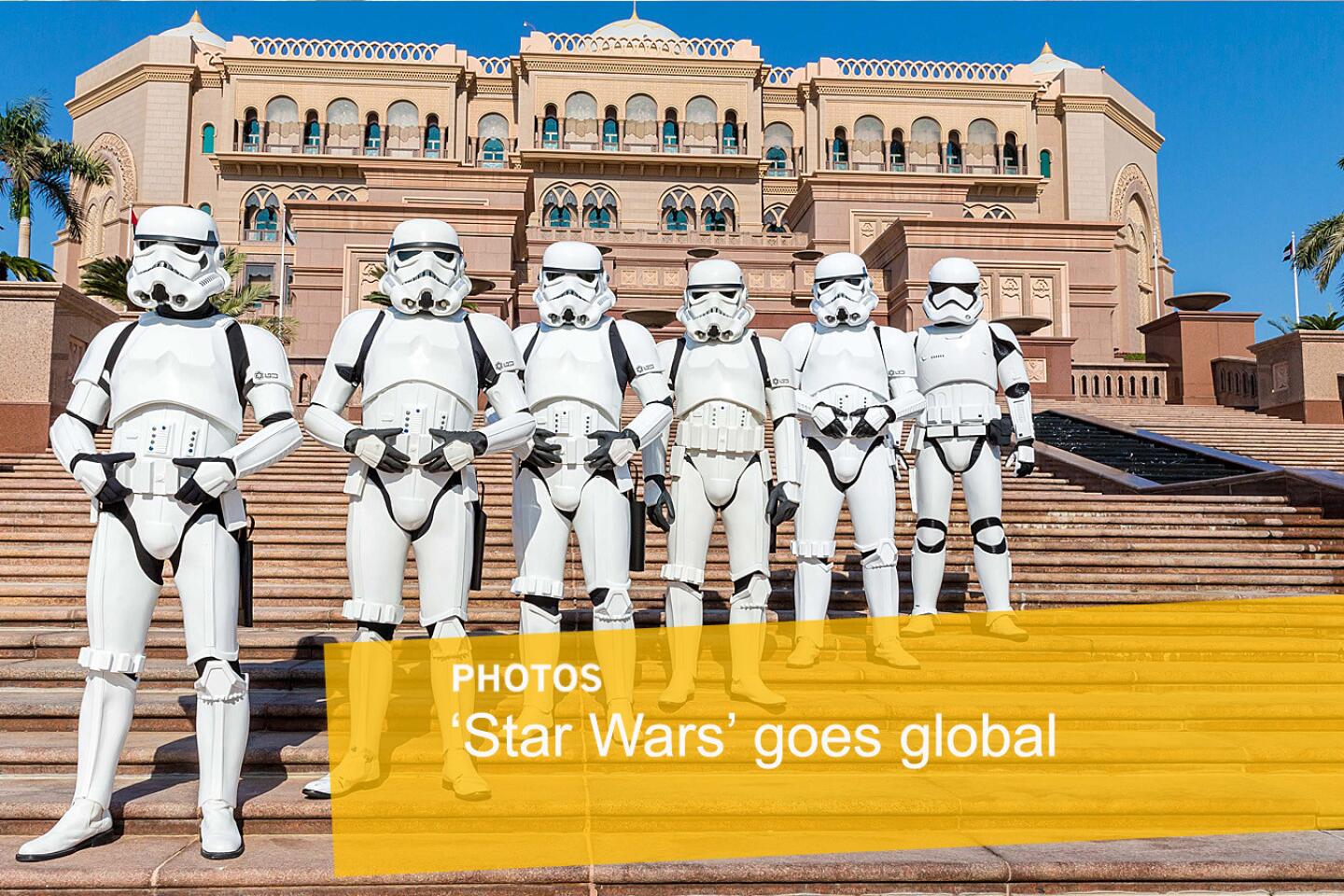$40 billion in global box office? Thank China and ‘Star Wars’
Paramount’s “Terminator: Genisys” didn’t get much love from U.S. moviegoers. But the Arnold Schwarzenegger film took in a princely $350 million overseas, nearly four times its North American haul, turning a domestic flop into a global success.
It was a similar tale for Universal Pictures’ “Everest” and 20th Century Fox’s “Kingsman: The Secret Service,” two films that did far better overseas than they did in the U.S. And increasingly, it’s the international response that matters most to Hollywood.
As 2015 comes to a close, global box-office receipts are expected to hit a record $40 billion — a 10% increase over 2014.
Most of that gain is coming from overseas, where a rising middle class with more disposable income to spend on entertainment is giving Hollywood a much-needed second wind. Nearly 73% of box-office revenue this year was generated outside the domestic market, up from 66% in 2010.
SIGN UP for the free Indie Focus movies newsletter >>
“There’s no overstating the enormity and essential nature of the international box office, led by China,” said Paul Dergarabedian, senior media analyst with Rentrak, the entertainment data firm.
The blockbuster numbers were helped by several very popular films, including “Star Wars: The Force Awakens,” “Jurassic World” and “Furious 7.” Those films helped drive the domestic box office to a record $11.1 billion in 2015, a 7% increase over last year.
But much of that domestic increase can be tied to higher ticket prices, including premiums charged for 3-D and Imax screenings. Overall, domestic movie attendance has been relatively flat for much of the last decade. An estimated 1.34 billion tickets will be sold in the U.S. and Canada this year, up slightly from 2014.
As a result, studios are increasingly relying on foreign markets to drive their profits, and they’re looking for ways to better court consumers in locations where the movie business is still growing.
Box-office revenue in China jumped nearly 50% to $6.8 billion in 2015, thanks to a combination of U.S. exports and homegrown movies. Other countries experiencing rising theater attendance include Mexico, Brazil, Germany, Spain and Britain. Japan, France, South Korea and Russia remain major contributors to the expanding global market.
The global push has changed how Hollywood does business. More than ever, studios greenlight movies that are more likely to travel abroad. They tailor marketing campaigns to other countries’ tastes and make casting decisions with the international audience in mind.
One noteworthy example — and caution, spoiler alert ahead — was the recent 20th Century Fox movie “The Martian” in which an officer in China’s space administration, played by singer and actress Chen Shu, helps NASA rescue an astronaut stranded on Mars.
With “Star Wars,” Disney had to carefully tailor its campaigns in places such as Russia and South Korea, where the franchise wasn’t familiar.
In China, where “The Force Awakens” debuts Jan. 9, Disney had an army of Imperial Stormtroopers march on the Great Wall for a marketing stunt. To make further inroads overseas, studios also are investing more in local productions to tap into foreign audiences’ appetite for movies made with their own preferences in mind.
“Star Wars: The Force Awakens” hit the billion-dollar mark in a record pace of 12 days, bolstered by massive overseas sales, setting box-office records in Australia, Britain, Sweden, Poland and Russia among other countries.
As the success of “Star Wars” illustrates, big event films — the so-called tentpoles based on preexisting franchises — tend to do especially well around the world. For example, Universal’s hit “Furious 7” did nearly 77% of its grosses outside the U.S. and Canada, amassing $1.16 billion overseas. And in China and other countries, stars such as Schwarzenegger or Tom Cruise tend to have a longer box-office shelf life than they do in the U.S.
“The international marketplace tends to prefer brands and sequels and stars,” said Rob Moore, vice chairman of Paramount Pictures. “Both ‘Terminator: Genisys’ and ‘Mission: Impossible – Rogue Nation’ benefited internationally from those dynamics.”
It’s not just the sequels and aging stars that are driving Hollywood’s international fortunes.
Even Universal’s “Everest,” an ambitious movie that largely failed to take hold with American consumers, crested to $200 million worldwide thanks to substantial grosses overseas. Fox’s “Kingsman: The Secret Service” banked on its diverse cast and its twist on the familiar spy action genre to do $286 million internationally, more than double its U.S. numbers.
The global box-office surge is even more remarkable given the problems presented by exchange rates. The relative strength of the U.S. dollar has not been kind to companies doing business across borders, particularly in places such as Russia, Brazil and nations that use the euro.
If the value of the dollar were lower than it has been, the international growth would be even more pronounced, said Paul Hanneman, co-president of worldwide theatrical marketing and distribution at 20th Century Fox.
“There are some significant markets where we are really getting hammered,” Hanneman said, referring to the effect of foreign exchange rates on the global film business. “If we’d had no exchange-rate issues, the ratios would be even higher. You’re looking at significant growth around the world.”
Fox’s “The Martian,” for example, took in $369 million internationally. But in terms of 2013 exchange rates, that total comes out to roughly $474 million.
The global film business has accelerated as countries build more theaters and invest in developing local cultural industries. The global screen count increased 6% to 142,000 in 2014, driven by a 15% jump in the Asia Pacific region, according to the Motion Picture Assn. of America.
China has led the way with a multiplex building boom. In 2015, the country had about 32,000 cinema screens, up 40% from the previous year.
“There’s been a growth of exhibitor real estate in many parts of the world, particularly in China, and that has a major effect and indeed is the most influential factor,” said Duncan Clark, president of distribution at Universal Pictures International. “If you don’t have movie theaters in large towns, money’s just bleeding away from you in every release that occurs.”
Theater chains are building their businesses overseas to take advantage of the heightened demand for content. Cinemark, based in Plano, Texas, has expanded its circuit in Brazil, Argentina and Colombia and now has 173 theaters in Latin America. Mexican-based Cinépolis intends to expand its Latin American presence, with about 100 new theaters planned for the region through 2019.
Imax Corp., the big-screen cinema company, this year has added screens not just in China but in Stockholm, Copenhagen, Tokyo and Dubai.
“The international marketplace is absolutely thriving,” said Greg Foster, chief executive of Imax Entertainment. “The movie business has been incredibly successful in 2015.”
ALSO
Tired of your family? Here’s what you might see at the movies
‘Hateful Eight’ may fare well at the box office but won’t end ‘Star Wars’ reign
‘Anomalisa’ is an exceptional romance from Charlie Kaufman
More to Read
From the Oscars to the Emmys.
Get the Envelope newsletter for exclusive awards season coverage, behind-the-scenes stories from the Envelope podcast and columnist Glenn Whipp’s must-read analysis.
You may occasionally receive promotional content from the Los Angeles Times.

























